
ER Editor: We did publish a short piece on Germany’s involvement in Ukraine’s biological programs a few days ago, but this article by Freddie Ponton goes into much more detail.
That German (or US) researchers are involved in these biological programs or that certain private corporations are doesn’t prove anything nefarious in itself. But these situations point to the fact that nations not allowed to conduct such research by treaties or conventions they may have signed onto or that their laws do not permit get to do this by the backdoor in highly corrupt countries like Ukraine. Ditto for corporations. Then there’s the ‘dual-use’ problem, as Ponton explains below.
We remind readers that there is evidence to suggest that Ukraine’s own citizens have been experimented on in the past.

********
REVEALED: Germany’s Involvement in Military Biological Programs in Ukraine
FREDDIE PONTON for 21st CENTURY WIRE
According to the Russian Federation Permanent Representative to the UN Office in Geneva, Gennady Gatilov, extensive dangerous biological military weapons and research programs have been found in Ukraine.
As 21WIRE previously reported, many of these highly exotic projects are being funded by the United States, under the Pentagon’s Defense Threat Reduction Agency (DTRA).
However, the story does not end there. Other alleged bioweapons programs and their facilities are also funded and steered by Germany’s Foreign Ministry and the German Armed Forces.
The ramifications of these findings are disturbing, as they indicate that NATO member involvement in Ukraine is much deeper than previously thought.
 On March 31, 2022, during the plenary session of the Disarmament Conference in Geneva, UN Rep. Gatilov (image, left) demanded that all of these potentially dangerous biological research programs be investigated immediately.
On March 31, 2022, during the plenary session of the Disarmament Conference in Geneva, UN Rep. Gatilov (image, left) demanded that all of these potentially dangerous biological research programs be investigated immediately.
After extensive research including numerous well-documented sources, it now appears that everyone’s suspicion may be true after all – that Ukraine had become a NATO outsourcing destination for biological weapons research and development.
By now, it has now been confirmed and demonstrated that US Department of Defense and its subsidiary, the DTRA, are funding offshore defense biological and scientific research projects under the guise of ‘life sciences‘ research, development and training activities inside Ukraine. The evidence strongly suggests that these activities and programs related to countering and deterring biological weapons of mass destruction as well as “emerging biological threats” – are actually being used as vehicles for so-called “dual-use” life science and classified projects. In this case, the term ‘dual use’ refers to the work and material pertaining to supposed biosafety research is completely interchangeable with the development of internationally prohibited bioweapons. Because of the inherent ambiguity of the area of research, such programs and their facilities have proven to be impervious to any meaningful oversight or international inspection regime.
Furthermore, it is easy to understand the legal and regulatory burden associated with so-called ‘Gain of Function’ (GOF) research in NATO countries, and therefore there is a temptation for unscrupulous individuals and organizations to export such risky projects to less strict regulatory environments, specifically destinations which rank high on the global corruption index, like Ukraine.
It is important to first take a closer look at the German-Ukraine relationship in order to better understand how deeply German interests are invested in Ukraine.
Germany is Ukraine’s largest civilian bilateral donor
According to the latest Organisation for Economic Co-operation and Development (OECD) and Development Assistance Committee (DAC) figures, Germany is Ukraine’s largest bilateral donor with payments amounting to around $220 million USD (OECD official development assistance 2018-2019) – which is actually ahead of the United States, which gave just under $200 million USD. In addition to this, Germany makes contributions through the EU (according to the OECD DAC, more than €400 million euros in 2018-2019 – the largest amount contributed by any single donor. Since 2014, Germany has provided a total of approximately €1.83 billion euro in bilateral support (Source).
Bilateral Development Cooperation
In the sphere of bilateral development cooperation, Germany has been supporting Ukraine’s political and economic ‘transformation’ with pledges totaling €771 million euros since 2014. An additional €96.5 million euros in new commitments were agreed at intergovernmental negotiations on 30 November 2021. Cooperation is focused on promoting democracy, a sustainable economy (including through vocational education and training), and civil society (including numerous NGOs and ‘stakeholder’ organizations), energy efficiency, and the supposed ‘stabilisation’ of eastern Ukraine.
Cooperation between the governments of Germany and Ukraine is further shored up by more than 70 town and municipality ‘twinning’ arrangements.
Moreover, a loan guarantee scheme has also been made available to Ukraine – launched by the German government in 2014, and totalling €500 million euros (Source).
Military support
Germany has been supporting Ukraine’s military medical service since 2019 with capacity-building measures (donations of medical supplies and equipment), as well as by providing medical care to wounded soldiers in German military hospitals. Since 2014, a total of 149 members of Ukraine’s security forces have been taken to Germany for medical treatment (in both Bundeswehr and civilian hospitals).
Overall, Germany’s military medical donations (including medical supplies) since 2014 amount to more than €13 million euros. In the context of a German-Estonian joint project, Germany is fully funding a deployable field hospital (procurement cost of €5.3 million euros, plus a training component). The estimated delivery date was the end of February or beginning of March 2022 (Source).
In 2016, Germany declared five bio-defence facilities. The CBM (Confidence Building Measures) submission provides their names, locations, the floor areas of the facilities’ laboratories, the organizational structure of the facilities, descriptions of the biological defence work carried out at the facilities, details about their publication policies, and lists of publicly available papers and reports resulting from work carried out in these facilities.
The main centre of Germany’s medical bio-defence activities, the Armed Forces (Bundeswehr) Institute of Microbiology, is the first facility listed. Located on Munich’s Neuherbergstrasse, the facility was reported in 2016 to have some 20 scientists and 39 technicians working in a total lab-floor area of 1325 m2, broken down into 1258 m² of biosafety level 2 (BSL2) laboratories, and 67 m² of a BSL3 laboratory space. The scientific disciplines represented are medicine, veterinary medicine, microbiology, virology, bacteriology, immunology, molecular biology, epidemiology, and laboratory medicine (see more info here).
Suffice to say that Germany has substantial invested interests in Ukraine, and of course such generosity towards Ukraine must be compensated one way or another. I mean nothing is for free in this world right!?
Now let’s get into it…
Germany Biosecurity / BioDefense Research in Ukraine
In 2013, the Federal Foreign Office launched the German Biosafety Program, with which Germany is working in various countries as part of the Global Partnership of the G7 which is implementing sustainable projects in the field of biosecurity against the proliferation of weapons and materials of mass destruction. According to the German Ministry of Foreign Affairs, the program also contributes to strengthening the Biological Weapons Convention (BTWC). The third program phase is 2020-2022, where activities are currently being implemented in nine partner countries, with two supra-regional projects.
SEE ALSO: Pentagon-Ukraine Bio Labs: The Hunter Biden Connection
The aim of the program is to support partner countries in controlling biological security risks, such as deliberate misuse of dangerous pathogens and toxins, and outbreaks of highly pathogenic diseases and pandemics. This can also be viewed as an effort intended to prevent the misuse of biological pathogens that could also be dangerous to Germany.
In this article we will investigate their activities in Ukraine – and to see if, like the US Department of Defense’s DTRA with the assistance of defense contractors such as Black & Veatch and Metabiota, the Germans have also developed their own military biological program in Ukraine.
The German Biosafety Program consists of several individual projects in Ukraine that are implemented together with the following German institutions:
- Robert Koch Institute
- German Society for International Cooperation
- Bernhard Nocht Institute for Tropical Medicine
- Friedrich Loeffler Institute for Animal Health
- Institute for Microbiology of the German Armed Forces
The program focuses on six areas: awareness-raising, biosafety and security, disease surveillance, detection and diagnostics, and networking and capacity building.
With a financial volume of over €45 million euros (2013 – 2019), and a further approx. €16.72 million euros (2020 – 2022), Germany claims to be helping partner countries to minimize biological hazards and the associated proliferation risks. At this stage we do not have the exact figures or percentage of this budget which is allocated to Ukraine.
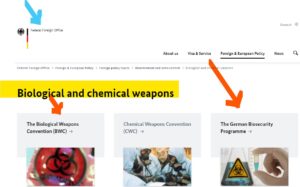
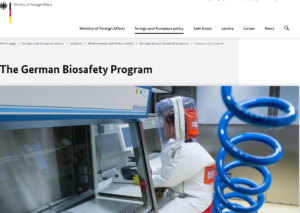
Source: Web page from German Ministry of Foreign Affairs
Projects of Germany’s Biosecurity Program
In 2002, a G7 initiative entitled, “Global Partnership Against the Spread of Weapons and Materials of Mass Destruction” was launched at the G7 Summit in Kananaskis, Canada. It makes an important contribution towards the reduction of nuclear, chemical, biological and radiological proliferation risks in the world. Improving biosecurity, in particular, has in recent years been identified as a priority of this initiative. In 2013, the Federal Foreign Office launched the “German Partnership Program for Excellence in Biological and Health Security” for an initial period of three years. It has been designed to mitigate biological security hazards and to establish and improve necessary biosecurity capacities all over the world. After being evaluated in 2016 and 2019, it was extended until 2022 under the banner of the German Biosecurity Program.
It’s important to reiterate here that bacteria, viruses, and biological toxins may be used for peaceful research purposes, but it can also be used for either militarized bioweapons or terrorist purposes (dual use) by both state and non-state actors. The stated objectives of the German Biosecurity Program are to reduce the risk of bio threat agent dissemination (biosafety and biosecurity), to set up systems for bio surveillance, or early identification of unusual disease outbreaks, and to discover and identify specific dangerous pathogens. In addition, the program is said to raise awareness of biological hazards in partner nations, and to further strengthen the specialist expertise of national partner institutions (capacity development).
In cooperation with the Deutsche Gesellschaft für internationale Zusammenarbeit (GIZ) GmbH, an association for international cooperation, the German Armed Forces (Bundeswehr) Institute of Microbiology is currently conducting the following international projects within the German Biosecurity Program:
Biosecurity Defense Project 1
“Ukrainian-German biosafety initiative for zoonoses risk management near the EU external border”
Background:
The ongoing fragile political and economic situation in Ukraine, the unresolved conflict with Russia and the associated problem of internally displaced persons, as well as the unstable situation in the health system are currently among the greatest challenges facing Ukraine.
In addition, the long-standing centralization of existing laboratory capabilities and the shifting of investments in infrastructure to Kyiv have led to biosecurity and health surveillance deficiencies in the outlying regions of Ukraine. Due to the natural occurrence of dangerous infectious diseases such as anthrax, rabbit fever or brucellosis, there are also dangers for the safety of the population. Abuse of these pathogens in the course of the armed conflicts in eastern Ukraine or by criminal groups might be difficult to detect.
Objectives:
The Institute for Microbiology of the German Armed Forces Institute for Microbiology of the Bundeswehr (IMB) and the German Society for International Cooperation (GIZ) GmbH have been running a cooperation project in eastern Ukraine in Kharkiv.
Measures:
The Ukrainian partner for the implementation of the project goals is the Institute for Experimental and Clinical Veterinary Medicine (IECVM) in Kharkiv. The institute is a national scientific center engaged in surveillance and control of infectious diseases, coordination of immunization programs and prevention of infectious diseases. With the start of the third project phase in 2020, the National Medical University of Kharkiv (KhNMU) was chosen as a partner.
It is worth remembering Kharkiv is where one of the Pentagon’s bio reference laboratories are located, where it has been reported that at least 20 Ukrainian soldiers died of swine flu in January 2016, and another 200 were hospitalized. By March of the same year, 364 people had died from swine flu in Ukraine.
This biosecurity project focuses on:
- Training of specialist staff in the diagnosis of dangerous pathogens
- Strengthening of specialist staff in the application of international laboratory standards
- Studies on the occurrence of dangerous pathogens in Ukraine
- Development of a German-Ukrainian network for Zoonose risk management
- Promotion of young scientists in Ukraine.
The “Ukrainian-German Biosafety Initiative for zoonoses risk management”can also be found in the 2018 Global Partnership Against the Spread of Weapons and Materials of Mass Destruction GPWG Report, a document tracking international threat reduction activities of member countries.
Germany’s International Biosecurity Projects in Ukraine
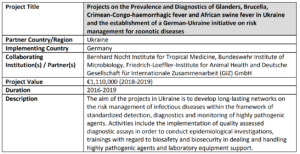
Source: Table extracted from the 2018 GPWG report published by German MOFA (Ministry of Foreign Affairs)
NOTE: You can follow the progress of the biosecurity projects from the Institute for Microbiology of the German Armed Forces “Ukrainian-German Biosecurity Initiative for Zoonoses Risk Management Activities in Ukraine Since 2016:
» 2021 » 2020 » 2019 » 2018 » 2017 » 2016
German-Ukraine Biosecurity Defense Project: AA Ukraine III
Strengthening biosecurity in dealing with proliferation-critical animal disease pathogens in Ukraine;
Duration: 01/2020 – 12/2022
Funding: German Federal Foreign Office
Project at a glance:
This project is a continuation of a cooperation between the Friedrich Loeffler Institute for Animal Health (FLI) and two Ukrainian institutes, the State Scientific Research Institute of Laboratory Diagnostics and Veterinary and Sanitary Expertise SSRILDVSE and Ukraine State Scientific Control Institute of Biotechnology and Strains of Microorganisms (SSCIBSM / DNKIBSHM) in Kiev, which are responsible in the field of veterinary diagnostics and handling of highly pathogenic biosecurity-relevant pathogens. The project is funded by the German Foreign Office under the German Biosafety Partnership Program and is in its third funding phase since the beginning of 2020.
Objectives:
The project aims to strengthen the capacity in partner countries to diagnose bacterial infections such as anthrax, brucellosis, and glanders, and viral infections such as African Swine Fever (ASF), and Crimean-Congo Haemorrhagic Fever (CCHF) in animals.
Methods:
These overall objectives are addressed in three work packages, which are also represented by the three different institutes of the FLI (INNT/INEID, IVD and IBIZ), together with the two partner institutions in Ukraine ( SSCIBSM / DNKIBSHM)
INNT / INEID : Institute of Novel and Emerging Infectious Diseases /Institute for Novel and Emerging Animal Pathogens
IVD: Institute of Diagnostic Virology
IBIZ: Institute of Bacterial Infections and Zoonoses
These Projects are classified by themes:
WP1: Brucellosis, glanders, anthrax (FLI-IBIZ)
WP 2: African swine fever (ASF) (FLI-IVD)
WP 3: Crimean-Congo hemorrhagic fever virus (CCHFV) (FLI-INNT). Molecular and serological methods are used to test the samples.
The role of FLI and INNT in the German Biosecurity Program in Ukraine
When looking further into the WP3 Project, we realised that the Friedrich Loeffler Institute for Animal Health (FLI) is the partner of the Institute for Microbiology of the German Armed Forces, and this partnership stretches across several related projects. This poses the same dilemma with the US Department of Defense DTRA financing and partnering in highly sensitive BioForensic projects in Ukraine, which of course includes the retrieval, handling and study of highly dangerous pathogens. The lack of transparency and international independent oversight in such a partnership is questionable to say the least, and of course raises some very fundamental yet concerning questions about the intention and scope of these projects.
German-Ukrainian Project on Bird Flu
According to investigative journalist Dilyana Gaytandzhieva’s article, German and Ukrainian scientists conducted biological research on particularly dangerous pathogens in birds (2019-2020). The project was carried out by the Institute for Experimental and Clinical Veterinary Medicine (Kharkov) and The Friedrich Loeffler Institute, Federal Research Institute for Animal Health (FLI) from Germany.
According to the project description, the main objective of this project was to sequence the genomes of orthomyxoviruses (causes bird flu) and to discover new viruses in birds.
For Washington’s part, the use of migratory birds to potentially transmit pathogens has been an important area of research conducted between the Smithsonian Institute and the US Department of Defense in the past.
Gaytandzhieva added that the Russian Defense Ministry also demonstrated that in 2020 the DTRA funded a similar project in Ukraine known as UP-4. The aim of that project was to explore the potential of particularly dangerous pathogens that can be transmitted by migratory birds, including the highly pathogenic H5N1 influenza, whose lethality in humans can reach 50%, and the Newcastle Disease Virus (NDV), a highly infectious disease affecting poultry and other birds.
Ukrainian Bio Labs
At this point, we can return to further and investigate the potential synergies between the Ukraine State Scientific Control Institute of Biotechnology and Strains of Microorganisms (SSCIBSM / DNKIBSHM) and the work undertaken by the US Department of Defense’s DTRA, and their associated contractors Black & Veatch Special Projects Corp and Metabiota Inc in Ukraine. Here we can also identify Germany’s local partners in Ukraine and see if they too were working with the US Department of Defense and their contractors.
Well, to be honest it didn’t take long for us to find confirmation that employees of the Ukraine Institute (SSCIBSM / DNKIBSHM) who are in a cooperation agreement with the German Friedrich Loeffler Institute for Animal Health (FLI), and are also participating in workshops and meetings organised by none other than Black & Veatch and Metabiota Inc.
Here are at least 4 confirmed series of meetings:
Meeting 1 (click link for source)
From March 25 to 27 (Session I) and from April 2 to 4 (Session II) 2019 employees of DNKIBSHM (Klestova ZS, Kudryavchenko OP), at the invitation of Black & Veatch Special Projects Corp. and Metabiota, in the framework of the Biological Threat Reduction Program in Ukraine (PBS), took part in meetings on the launch of the Joint Biological Research Project (JDS) of the UP-10 project (Kyiv, Ukraine).
Meeting 2 (click link for source)
On June 20, 2019 , Deputy Director for Research of DNKIBSHM (Klestova ZS), at the invitation of Black and Veatch Special Projects Corp. / “Metabiota Inc.” as part of the cooperation between the Government of Ukraine and the United States of America, took part in the eleventh meeting of the Joint Working Group (Kyiv, Ukraine – “Klitschko Expo”).
Meetings 3 (click link for source)
From October 21 to 22, 2019, an employee of DNKIBSHM (Voronina AK), at the invitation of Black and Veatch Special Projects Corp. / Metabiota Inc., participated in the Seminar within the concept of “Unified Health” “:” Writing Grant Applications “within the Biological Threat Reduction Program in Ukraine with the support of the US Department of Defense Threat Reduction Agency (Kyiv, Ukraine).
Meeting 4 (click link for source)
40. From December 17 to 19, 2019 , the staff of DNKIBSHM (Napnenko OO, Kudryavchenko OP), at the invitation of the companies “Black and Veatch Special Projects Corp.” / “Metabiota Inc.”, in the framework of the Biological Reduction Program Threats in Ukraine (PFSA) participated in the Workshop on the Results and Implementation of the CAP Model of the Joint Biological Research (JAP) UP-10 Project: “Regional Risk Assessment of African Swine Fever (ASF) in Wildlife and Through Trade Routes (‘From the field to the table’) in Ukraine – approaches to the development of effective quarantine measures and strategies to control the ASF virus” (Kyiv, Ukraine).
And here is the confirmation (from the same page) where the Deputy Director of Research of the Ukraine State Scientific Control Institute of Biotechnology and Strains of Microorganisms (SSCIBSM / DNKIBSHM) is invited by the German Friedrich Loeffler Institute for Animal Health (FLI) to attend an international Zoonoses Symposium in Berlin, Germany.
Or here with the Ukraine State Scientific Control Institute of Biotechnology and Strains of Microorganisms (SSCIBSM / DNKIBSHM) participating in training on diagnosis of Anthrax and Brucellosis part of the German Biosafety Program to Ukraine with GIZ and FLI. The evidence of them working together on Molecular Typing of Ukrainian Bacillus Anthracis Strains are available here. The project is financed by the German Federal Foreign Office within the framework of phase III of the German Biosafety Program (Ref. AA-OR12-370.43 BIOS FLI UKR).
Again, I want to be very clear that no accusations are being made here – we are merely pointing out to the fact that the US Defense Department and the DTRA, which have financed both U.S. biotech firms Black & Veatch and Metabiota’s work in Ukraine, just happened to be working with Ukraine’s State Scientific Control Institute of Biotechnology and Strains of Microorganisms (SSCIBSM / DNKIBSHM) the very partner of the Friedrich Loeffler Institute for Animal Health (FLI), which itself is a partner of the Institute for Microbiology of The German Armed Forces. Beyond this, readers are welcome to draw their own conclusions.
Further below, we will see that the Institute for Microbiology of the German Armed Forces is also developing cooperation with The Kharkiv National Medical University (KhNMU) in Ukraine.
Incidentally, The Institute of Novel and Emerging Infectious Diseases (INEID) part of the Friedrich Loeffler Institute for Animal Health (FLI) is also focused on viral zoonoses caused by Coronavirus and SARS-CoV-2 amongst others. Again, we are merely pointing out these clear relationships, and not necessarily accusing these German organizations of being involved in any nefarious activities.
The German Biosafety Program is carried out under the patronage of the German Ministry of Foreign Affairs. As for GIZ the German Society for International Cooperation, they have been operating in Ukraine since 1993. GIZ supports the Ukrainian government in the process of public administration reform and contributes to the German Biosecurity Program.
“Fostering Biosafety and Biosecurity for a Safer World”
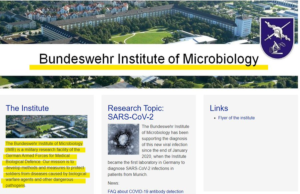 Going back to the IMB, also known as the Bundeswehr Institute of Microbiology (Institute of Microbiology of the German Armed Forces), we must reiterate that it is a military research facility of the German Armed Forces for Medical Biological Defence.
Going back to the IMB, also known as the Bundeswehr Institute of Microbiology (Institute of Microbiology of the German Armed Forces), we must reiterate that it is a military research facility of the German Armed Forces for Medical Biological Defence.
They develop methods and measures to protect soldiers from diseases supposedly caused by biological warfare agents and other dangerous pathogens.
Most military around the world have accepted vaccinations as the best way of protecting their troops, and therefore it is not too much of a stretch to say that to develop such vaccines, one needs to study and manipulate viruses and dangerous pathogens.
There is no doubt that Germany, the US and other European countries, have all developed strong ties with the Ukrainian scientific biodefense R & D community, as the country provides an ideal bio-forensic site for biosafety, biosecurity and research related to the study of dangerous and high threat pathogens.
The problem remains that such activities undertaken in a country as violent as Ukraine can only be described as a high risk operation that could unnecessarily endanger the European populations, and the world at large.
February 2020, Ukrainian officials kicked-off the start of their third funding phase with a visit to Kharkiv. The Kharkiv National Medical University (KhNMU) and the Institute of Microbiology of the German Armed Forces sealed their future cooperation by signing a declaration of intent. One would expect to find details of their relationship but the KhNMY is not advertising this cooperation on their website. Why would that be, if it is genuine?
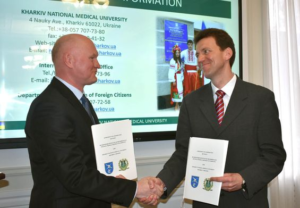
In partnership with the German Armed Forces (Bundeswehr) and Kharkiv National Medical University (KhNMU), they were the co-organizers of the 2nd Ukrainian scientific-practical conference on “Relevant problems of medicine in the security and defense sector,” and the topic of hybrid warfare was on the agenda as well. The Head of the project, the director of the Bundeswehr Institute of Microbiology Mr. Haier von Butler, said that German representatives hope for long-term cooperation with KhNMU, and are ready to provide diagnostic test systems, to train specialists and to further promote scientific cooperation and improve the diagnosis of Hantavirus infection in Kharkiv region. “We hope that this partnership will serve to broaden the range of our cooperation and, in addition, to strengthen the link between veterinary and human health medicine.” (Image: December 28, 2021, the original picture can be found here and here).
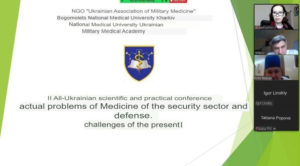
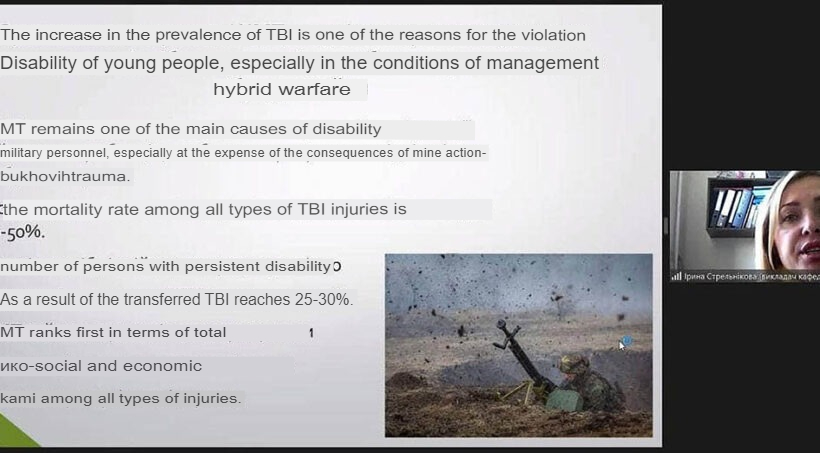
(Pictures from the event presentations have been translated to English)
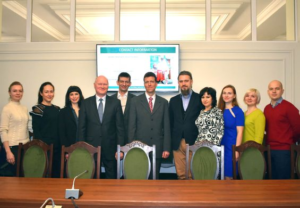 Here is a group photo (image, left) with representatives of the Institute of Microbiology of the German Armed Forces (IMB), the German Society for International Cooperation (GIZ), Ukraine National Scientific Center Institute of Experimental, Clinical Veterinary Medicine and KhNMU.
Here is a group photo (image, left) with representatives of the Institute of Microbiology of the German Armed Forces (IMB), the German Society for International Cooperation (GIZ), Ukraine National Scientific Center Institute of Experimental, Clinical Veterinary Medicine and KhNMU.
The IMB, The Institute for Microbiology of the German Armed forces, provides the expertise and scientific capabilities on a global scale, which makes them directly available for deployed Bundeswehr military personnel. The aim is to rapidly detect, under field conditions, any human or animal diseases caused by potential biological agents, to identify treatment options, and to recommend adequate protective measures.
The Bundeswehr Institute of Microbiology is a departmental research facility that specialises in biological medical defence. Its mission is to develop procedures and measures to protect military (Bundeswehr) personnel from disease caused by biological agents and to restore their health in the event of illness. Therefore, the scientific focus of the Institute is on a variety of pathogens and biological toxins that could potentially be used as biological warfare agents.
Research conducted at the Institute is translational in nature. Their aim is to develop specific products that are made available to users or to provide science-based services by the Institute itself. The focus is on products related to medical biological reconnaissance, i.e. diagnostic methods to be used in the field as well as novel methods for attribution investigation in the field of microbial forensics. Moreover, these also include projects concerning prophylaxis and therapy as well as surveillance and risk assessment are carried out.
The Bundeswehr Institute of Microbiology has been commissioned to perform the functions of three national consultant laboratories, namely for tick-borne encephalitis (TBE), Brucella and Yersinia pestis. Their range of services is also available to all civilian healthcare facilities.
German Armed Forces (Bundeswehr) Institute of Microbiology – Presentation:
Central Diagnostic Unit of the IMB is involved in the EMERGE (“Efficient response to highly dangerous and emerging pathogens at EU and international level”) research project that is funded by the European Union.
EMERGE is a European network of 40 laboratories that are specialised in the diagnostics of Risk Group 3 bacteria, and Risk Group 3 and 4 viruses. The network’s objective is the evaluation of routine procedures and new diagnostic material for highly pathogenic microorganisms. Proficiency testing schemes for external quality control, training programs and the exchange of experience during network meetings serve to enhance the ability to react appropriately to threat situations and disease outbreaks at the EU level and beyond.
Further information on the EMERGE program: www.emerge.rki.eu and at the organisation’s website.
Bernhard Nocht Institute for Tropical Medicine in Ukraine
Scientists at the Bernhard Nocht Institute for Tropical Medicine worked intensively with the Public Health Institute of Ukraine (PHCU), the Ministry of Health in Kiev, as well as with regional laboratories in Kharkiv, Lviv, and Odessa
A Memorandum of Understanding (MOU) between the Centre for Public Health of the Ministry of Health of Ukraine and the Bernhard Nocht Institute for Tropical Medicine Virology and Laboratory BSL was signed July 18, 2018. Both parties agreed to cooperate within the framework of a joint research project: improving the level of biosafety by improving diagnosis and research into the prevalence of Crimean-Congo Hemorrhagic Fever (CCHF), and Hantaviruses in Ukraine in 2018-2019. This was financed by the German Federal Foreign Office (Project No. 68727 EN 02761868). As part of this project, one thousand blood serum samples from citizens from different regions of Ukraine who belong exclusively to the Slavic ethnic group were sent to the Bernhard Nocht Institute for Tropical Medicine in Hamburg. The Russians have alleged that one of the goals of the US and its NATO allies is to develop dangerous bio agents that selectively target different ethnic groups amongst which the Slavic ethnic group.
In the following translated PDF document (below), you will find the early pages of the MOU between the Bernhard Nocht Institute for Tropical Medicine (BNITM) and the Public Health Center of the Ministry of Health of Ukraine (PHC). The PDF also provides evidence of the Friedrich-Loeffler-Institut (FLI) working on join research program P444, P44A, P44B – through the Science & Technology Center of Ukraine (STCU) in association with the USDA the United States Department of Agriculture.
The similarity to the research conducted by the DTRA UP8 and UP4 programs is obvious (some documents were identified other not, but all in all, it seems very plausible).
It is also important to note that Ukraine’s STCU is international in scope, with its main headquarters in Kiev, and regional offices in Kharkov and Lvov, as well as operations in Baku, Chisinau and Tbilisi. However, according to data recently released on April 14th by the Russian Ministry of Defence’s Chemical and Biological Threat Expertise Centre, the STCU’s main activity appears to be as “a distribution centre for grants for research of interest to the Pentagon, including biological weapons research.” In recent years, Washington is believed to have spent more than $350 million on STCU projects. Additionally, it is believed that the U.S. customers and sponsors of STCU are the Department of State and the Department of Defense, with funding also provided through the Environmental Protection Agency (EPA), the US Departments of Agriculture, Health and Energy.
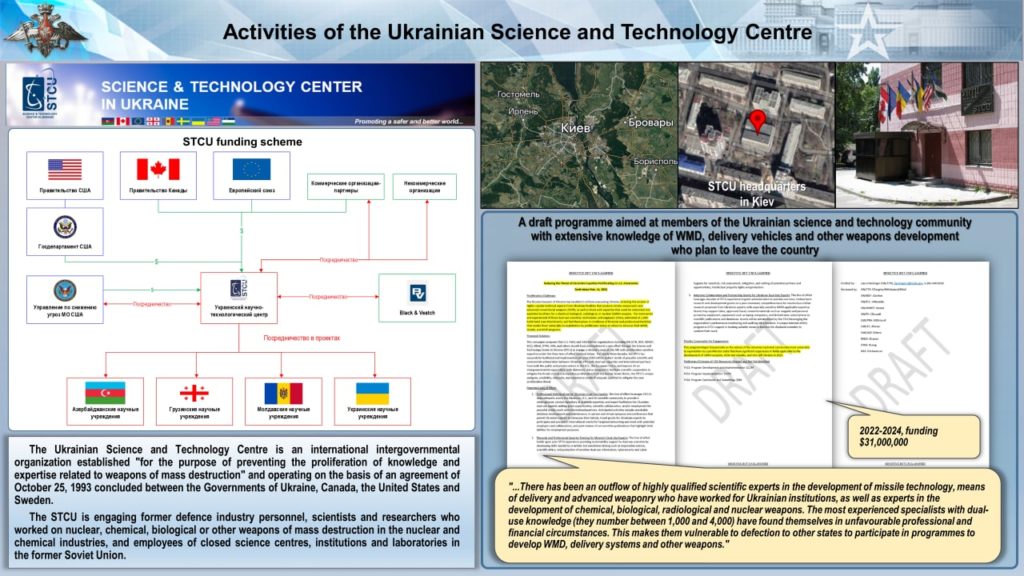
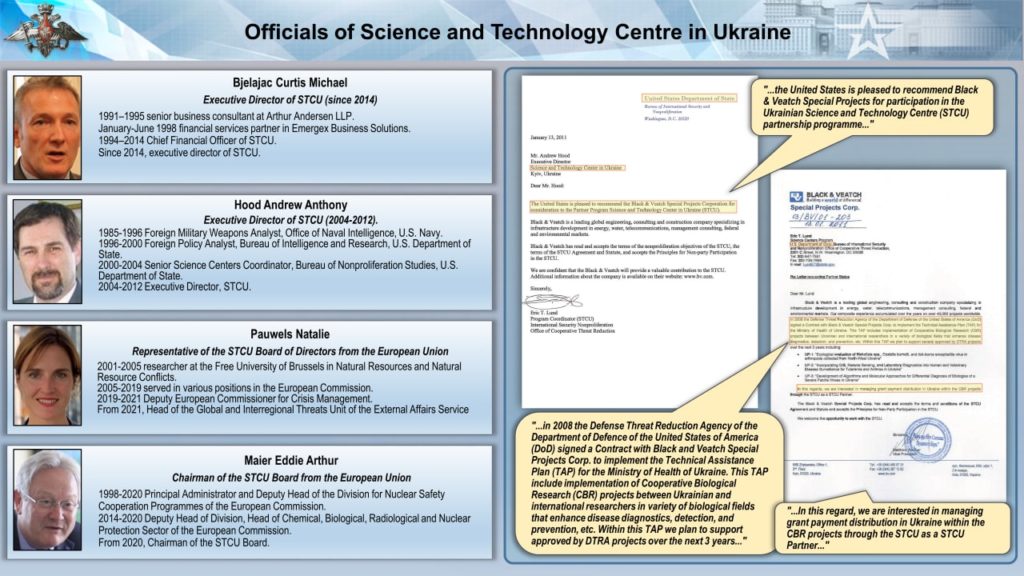
Within the same April 2022 Russian MoD data release, it is also stated how during Russia’s special military operation in Ukraine, it was established that US scientists from a laboratory in Merefa (Kharkov Region) were testing potentially dangerous biological drugs on patients of the regional clinical psychiatric hospital No 3 in Kharkov between 2019 and 2021.
Thus, during the special operation in Ukraine, it was established that US scientists from a laboratory in Merefa (Kharkov Region) were testing potentially dangerous biological drugs on patients of the regional clinical psychiatric hospital No 3 in Kharkov between 2019 and 2021.
Persons with mental disorders were selected for the experiments on the basis of their age, nationality and immune status. Special forms were used to record the results of 24-hour patient monitoring. The information was not entered into the hospital database and the staff of the medical institution signed a non-disclosure agreement.
In January 2022, the laboratory in Merefa was shut down and all equipment and preparations were moved to western Ukraine.
There are a number of witnesses to these inhuman experiments, whose names we cannot disclose for the sake of their safety.
Certainly, the disturbing specter of western-funded Ukrainian institutions (especially they are funded and directed by the United States and EU member state Germany) engaged in the experimentation of disabled or mentally ill persons – should evoke similar horrors wrought upon Europe during the reign of Nazi Germany in the early 20th century. Such eugenics practices were thought to have been extinguished from the civilised world decades ago. To even consider that these and other questionable ‘life sciences’ endeavors, including the development of dangerous bioweapons materials or race-specific pathogens, are being offshored by western governments to an openly corrupted regulatory environment like Ukraine – should be grounds for further investigation by the appropriate domestic and international agencies.
Concerns about Life-Sciences ‘Dual-Use’ Research
A series of scientific publications in the early 2000’s ushered in an era of heightened concern about the potential for misapplication of scientific technological advancements to achieve malevolent outcomes. The “dual-use” dilemma is one with which the nuclear physics community has been dealing with for more than 70 years. However, in the realm of life sciences, advancements in biotechnology represent a “dual-use” dilemma in which the same technologies can be used legitimately for human benefit to cure or stave off epidemics, or misused for bioterrorism or for bio-weaponry purposes.
There has been an expansion of research involving pathogens of consequence, not only in the U.S. but globally, as well as an increase in foreign laboratory funding and associated capacity to conduct exotic research. However, international standards on how these facilities are built and designed and operated are often hidden under a veil of secrecy. The lack of transparency in sensitive research funded by western governments including their Department of Defense, Health and Agriculture, just to name a few, offers ample opportunities and means for dangerous Gain of Function (GOF) research to be conducted under the cover of international Biosafety Research Program, or other similar projects.
The work of EcoHealth Alliance (EHA) and Metabiota at the Wuhan Institute of Virology in China – is a striking example of potentially questionable partnerships.
It is quite clear now that both companies enjoy a close relationship with the US DOD or/and the CIA, which could explain why they are still in business today. Any other companies would have not survived such public outrage nor the bad publicity arising from their proximity with characters such as Hunter Biden, Ghislaine Maxwell, and Peter Daszak, the President of the much-maligned EcoHealth Alliance.
GOF studies involving pathogens with pandemic potential is a term used to refer to any modification of a biological agent that confers new or enhanced activity.
The impact of proliferation of biosecurity programs is obvious. What are the actual guarantees given to the public to ensure that those with malevolent intentions cannot easily gain access to extremely dangerous pathogens, or what happens if unscrupulous agents were to work within these biosecurity programs?
GOF, as well as LOF (loss-of-function) studies are commonplace in the life sciences, and have been essential elements of modern molecular biology. According to its proponents, the potential benefits of GOF studies include insights into fundamental aspects of host-pathogen interactions, the pandemic potential of emerging pathogens, public health and preparedness efforts, and development of medical countermeasures. However, the potential risks of GOF studies include the generation of novel engineered pathogens that could pose a pandemic threat, either accidentally, or if released intentionally, as well as the creation of information that could be misused to threaten public safety or national security.
The additional risk of proliferation of these questionable practices, discussed above, exacerbates these risks as the number of biolabs conducting high containment research increases, including those studies employing GOF-type approaches. The increasing number of these types of labs also increases the risks of accidental, or deliberate weaponised release of an experimental pathogen.
I will finish this analysis by directing you to an article published by TASS (Russian News Agency) on the 31 March, 2022, entitled, “Russian envoy points to proof of Germany’s military biological activity in Ukraine,” where the following has been stated:
“Documents confirm that Germany was implementing its own military biological program in Ukraine, Russian Permanent Representative to the UN Office and other International Organizations in Geneva, Gennady Gatilov said at a plenary meeting of the Conference on Disarmament on Thursday.”
We shall look forward to the evidence that will support these Russians claims, and maybe then we can see if some of the concerns we have raised in this article are indeed justified.
To be continued…
READ MORE UKRAINE NEWS AT: 21st Century Wire Ukraine Files
************
Source

••••
The Liberty Beacon Project is now expanding at a near exponential rate, and for this we are grateful and excited! But we must also be practical. For 7 years we have not asked for any donations, and have built this project with our own funds as we grew. We are now experiencing ever increasing growing pains due to the large number of websites and projects we represent. So we have just installed donation buttons on our websites and ask that you consider this when you visit them. Nothing is too small. We thank you for all your support and your considerations … (TLB)
••••
Comment Policy: As a privately owned web site, we reserve the right to remove comments that contain spam, advertising, vulgarity, threats of violence, racism, or personal/abusive attacks on other users. This also applies to trolling, the use of more than one alias, or just intentional mischief. Enforcement of this policy is at the discretion of this websites administrators. Repeat offenders may be blocked or permanently banned without prior warning.
••••
Disclaimer: TLB websites contain copyrighted material the use of which has not always been specifically authorized by the copyright owner. We are making such material available to our readers under the provisions of “fair use” in an effort to advance a better understanding of political, health, economic and social issues. The material on this site is distributed without profit to those who have expressed a prior interest in receiving it for research and educational purposes. If you wish to use copyrighted material for purposes other than “fair use” you must request permission from the copyright owner.
••••
Disclaimer: The information and opinions shared are for informational purposes only including, but not limited to, text, graphics, images and other material are not intended as medical advice or instruction. Nothing mentioned is intended to be a substitute for professional medical advice, diagnosis or treatment.


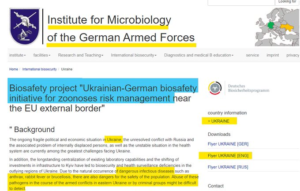






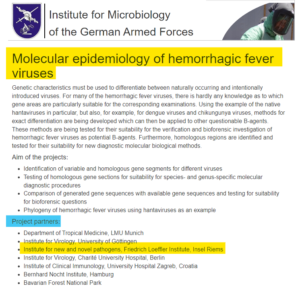
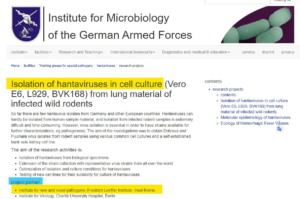
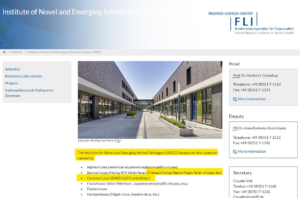




Good observation!
Notice how the Black & Veatch corporation is called Black & Witch in the document, as a result of the translation from Cyrillic to English. A quick search shows that “Veatch” shows up recurrently as ‘philantropic programs’.
I’ll refrain from conclusions.